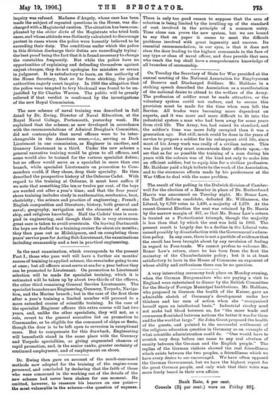The new scheme of naval training was described in full
detail by Dr. Ewing, Director of Naval Education, at the Royal Naval College, Portsmouth, yesterday week. He explained that the scheme, as now developed in accordance with the recommendations of Admiral Douglas's Committee, did not contemplate that naval officers were to be inter- changeable in the American sense,—i.e., serving as Deck Lieutenant in one commission, as Engineer in another, and Gunnery Lieutenant in a third. Under the new scheme a general executive training would be given to all officers, and some would also be trained for the various specialist duties; but no officer would serve as a specialist in more than one branch, while specialist Lieutenants on promotion to Com- manders could, if they chose, drop their specialty. He then described the prospective history of the Osborne Cadet. With regard to the training at Osborne, it must here suffice if we note that something like ten or twelve per cent. of the boys are weeded put after a year's time; and that the four years' shore training includes study in mathematics, mechanics, heat, electricity ; the science and practice of engineering ; French ; English composition and literature; history, both general and naval; geography, navigation and the elements of seaman- ship, and religious knowledge. Half the Cadets' time is occu- pied in engineering, and though their life is very strenuous, great care is taken to avoid overstrain. On leaving Dartmouth the boys are drafted to a training cruiser for about six months; they then pass out as Midshipmen, and on completing three years' service pass for Acting Sub-Lieutenant, the examinations including seamanship and a test in practical engineering.










































 Previous page
Previous page